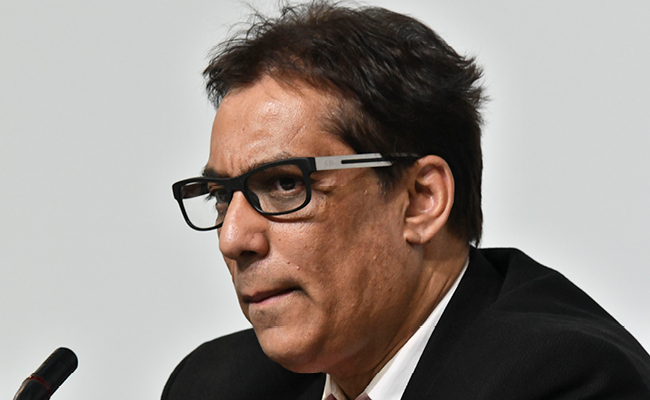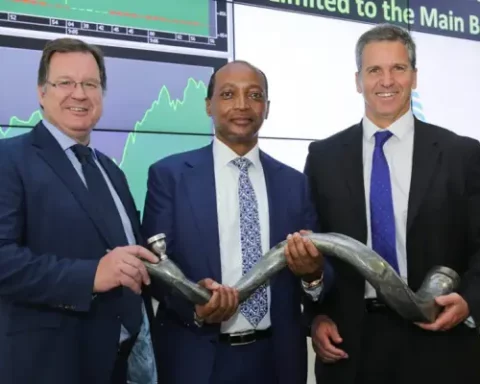In an act of regulatory duty but practical superfluousness, the JSE has suspended Ayo Technology Solutions from trading, even though the stock doesn’t actually trade that much.
The decision to bar a company that, for all intents and purposes, doesn’t trade, is just the latest example of how Ayo demonstrates the ineffectiveness of South Africa’s regulatory and ethical systems in practice.
Ayo has 360-million shares outstanding, of which about 170,000 are traded daily, which is about 0.05% of the shares in issue – sadly a proportion not unique on the JSE.
The company’s share price has plummeted 90.99% over the past three years and is now trading at more or less the same level as its anticipated end-of-year cash holdings of about R120m.
Sadly, what those cash holdings actually are is not currently known because the reason for the suspension is that Ayo failed to comply with JSE listing requirements by not publishing its annual report for the year ended August 31 2024 within the prescribed timeframe.
Ayo is controlled by controversial businessman Iqbal Survé.
The company has thrice in the past six months warned that it had to delay the publication of its results, but announced on stock exchange news service Sens that, actually, it wasn’t the company’s fault.
“This matter is beyond the direct control of Ayo’s management, and Ayo takes it seriously to ensure the financial integrity of the results,” it said. “Ayo expects, therefore, to release the audited annual financial statements on or before February 28.”
In direct control
The problem, it explained, is that the release was “contingent on the external quality reviewer, the independence and process of which we respect”, Ayo CEO Amit Makan said in a statement.
External quality reviews are often initiated because the auditors have made a judgment which they consider might be questioned. Often, it’s the result of some problem in the accounts, which could well be very much “in the direct control” of Ayo’s management.
Essentially, it could be because the auditors feel they better cover their asses.
Typically, an engagement quality control review is an independent review performed by an experienced auditor, sometimes a partner or senior reviewer, to assess the quality of an audit engagement before the audit report is issued.
It is a critical component of an audit firm’s quality control system, designed to ensure that the audit complies with professional standards, regulatory requirements and the firm’s policies.
You can understand why the auditors might want a double-check. Ayo replaced its joint external auditor after Thawt Inc resigned in October 2024. Then, CFO Pride Guzha quit in November last year and was replaced by Valentine Dzvova in December.
Ayo is not a significant force in business in South Africa – it announced a R229m loss last year – but it does help to illustrate precisely how dysfunctional the regulatory system is.
The Financial Sector Conduct Authority started its investigation into possible market abuse of Ayo shares in May 2018. The investigation was prompted by apparently suspicious trading activities, including significant purchases of Ayo shares by entities linked to Survé, which appeared to artificially maintain the company’s share price. These actions raised concerns about creating a misleading appearance of the stock’s market value.
In the meantime, Ayo is facing an application to be wound up, filed by the son of a deceased minority shareholder, which it is contesting. The action, brought by Howard Lowenthal, follows Ayo’s agreement to repay R619m to the Public Investment Corporation, which had invested R4.3bn for a 29% stake in the company before its listing in 2017.
Lowenthal, son of former JSE chair Norman Lowenthal, alleges this deal prejudiced minorities. Five years after the FSCA initiated action, the company is now suspended, but the investigation is not.
Right of reply
Ayo Technology Solutions Limited (AYO) demands an immediate right of reply or a retraction of Tim Cohen’s “opinion” article, “Ayo and a Tail of Sleeping Watchdogs” [“No Go for Ayo as JSE Suspends Trade”], recently published on Currencynews.co.za and then in Vrye Weekblad. It is fraught with inaccuracies and deliberate misrepresentations concerning AYO.
Cohen’s narrative is built on conjecture, lacking a foundation in verified facts.
In terms of the South African Press Council Code of Ethics and Conduct: “The media may strongly advocate their own views on controversial topics, provided that they clearly distinguish between fact and opinion, and not misrepresent or suppress or distort relevant facts.”
The errors are as follows:
Misrepresentation of Financial Reporting Delays – Cohen insinuates that AYO’s delay in financial reporting suggests misconduct. In reality, the postponement stems from an External Quality Control Review (EQCR) process beyond AYO’s control. Cohen’s failure to acknowledge this critical detail misleads readers about the true cause of the postponement. Please refer to the latest Sens announcement released regarding an update to the market and shareholders which may be found on AYO’s website.
False Claims Regarding Executive Movements – The article falsely asserts that Pride Guzha resigned from AYO for reasons nothing to do with his promotion. Guzha was in fact promoted to CEO of a subsidiary within the AYO Group, reflecting internal career progression rather than departure. Cohen’s portrayal omits this context, leading to a skewed interpretation of internal developments.
Distortion of Auditor Relationships – Cohen suggests that AYO replaced its auditors under dubious circumstances. In truth, Crowe was already serving as a joint auditor alongside Thawt. Thawt’s resignation was due to a conflict of interest compromising its independence, as detailed in official Sens announcements. Crowe’s continued role was a planned continuation, not an abrupt replacement. Cohen’s narrative disregards these documented facts, presenting a misleading account of AYO’s auditing practices.
EQCR is a standard process for listed entities to ensure continuity, accuracy, and compliance with auditing standards. An EQCR process therefore serves to reinforce confidence in financial reporting.
Erroneous Assertions of Control – The article perpetuates the misconception that Dr Iqbal Survé controls AYO. AYO is a publicly listed company with a diverse shareholder base and an independent board, on which Dr Survé does not serve, nor is he part of the executive team. Cohen, aware of this structure, chooses to once again ignore it, thereby deliberately misinforming readers about the company’s governance.
Misleading Interpretation of Regulatory Investigations – Cohen conflates separate issues by linking AYO’s suspension to an FSCA investigation and with an open question. Notably, AYO itself requested the FSCA investigation several years ago into suspicious trading activities, demonstrating a commitment to transparency. The JSE suspension occurred two days before the anticipated financial release, a timing that certainly raises questions yet is unrelated to the FSCA’s actions. Cohen’s conflation of these events distorts the narrative, suggesting impropriety where there is none.
Questionable Motives Behind Legal Actions – The article references legal actions by Mr Howard Lowenthal without having the facts or consideration for a different narrative to one that Mr Lowenthal has put forward. This suggests a patent bias on Cohen’s part since his “reporting” and/or his “opinion” is purely one-sided.
In summary, Tim Cohen’s article is a tapestry of speculation and selective reporting, failing to provide a balanced and factual account of AYO Technology Solutions’ circumstances. Such journalism does a disservice to readers seeking informed and objective analysis or a trusted opinion from a market commentator.
Taking the above serious factual errors into account, please ensure the article is corrected, removed or that this Right of Reply be published in both Currencynews.co.za and in Vrye Weekblad, with whom Mr Cohen and/or Currency News has a direct relationship.
This to be effected no later than 9am, March 3 2025.
We reserve our rights.
Issued by: Ayo Technology Solutions Limited
Top image: Iqbal Survé. Picture: Gallo Images/Wessel Oosthuizen.
Sign up to Currency’s weekly newsletters to receive your own bulletin of weekday news and weekend treats. Register here.










